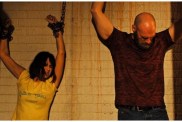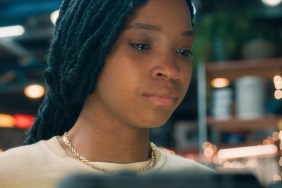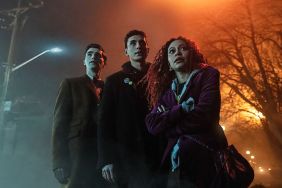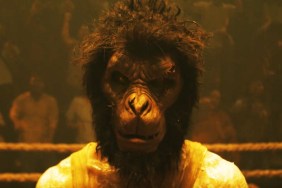Neil Jordan’s new film Ondine is about a woman (played by newcomer Alicja Bachleda) who may or may not be a magical sea creature and a little girl’s ardent wish to believe in something. Colin Farrell plays Syracuse, a fisherman who catches her in his nets, and doesn’t quite know what to make of her. The woman calls herself Ondine, after a water-nymph, which only serves to convince Syracuse’s daughter Annie that she is in fact a water-nymph — or a mermaid or a selkie or just about anything mythological that might bring some magic into her life. And the kid could use it, since she’s got some pretty harsh realities, what with being confined to a wheelchair, being on dialysis, and having divorced parents who are both alcoholics. Is it so wrong then to want to believe in a little fantasy?
Like some of his previous films about mythological creatures (In the Company of Wolves, Interview with the Vampire), Jordan uses the story as a treatise on the power of storytelling itself. Here, he describes his process with Ondine, what he’d like to do with Neil Gaiman’s The Graveyard Book, and what else he has in the works.
ComingSoon.net: Do you prefer to make fantasy films? Are you more comfortable with fantasy fare?
Neil Jordan: Yeah, I basically am, but I suppose the problem is that I don’t do comicstrip things. The fantasy films I do are slightly more complicated than “Spider-Man,” or stuff like that. I love making films where the real world and the unreal world intersect, where they clash and intersect and resolve themselves in something slightly unreal.
CS: Part of how the real and the unreal meet is with the song that Ondine sings if only Colin Farrell’s character Syracuse were more up on music, he might know what was happening a little sooner. How did the choice of the song come about?
Jordan: I was a Sigur Rós fan, and I wanted to work with that world of music, and so I spoke to them about it, and they said they were cool about it, they were interested, so I showed them the script, and they seemed very happy to do it. I didn’t have to do a sales job, and I needed a song, so I chose “All Alright,” because it seemed to suit the film.
CS: That’s their one song in English though!
Jordan: I know! (laughs) They usually sing in that made-up language, and in this one, they didn’t. It is English, but you can’t quite tell, and it’s a simple melody. It had to be a song that’s not immediately recognizable, so that when Colin sees it on television, he can realize what’s going on. So the most difficult thing wasn’t choosing the song it was finding a piece of video of them singing it. That was hard. I eventually got some concert footage, because they never did a video for it, and the videos they do have don’t feature them, so it was almost impossible to track that down. And we’re not using the whole song. We’re using a smaller section, the section any normal human being could sing. And Alicja [Bachleda] really makes it her own, the way she sings it.
CS: Did you know she could sing? Was that part of her audition, along with her tolerance to being submerged in cold water?
Jordan: You know, if you ask an actor or actress if they can sing, they say, “Of course!” If you ask if they can ride a horse, “Of course!” If you ask if they like spending a lot of time underwater, they say, “I swim in the Baltic!” And then when it comes time to get in the water, they say, “I didn’t know it would be like this.” But the audition didn’t include singing, no. But she could sing, and she had a music career in Poland, which I didn’t know about. She had some kind of cabaret career. She’s got a beautiful voice, actually. I mean, that was the point I worried most about in the movie, her singing to the waves (laughs). He just catches two lobsters, and fool that he is, he thinks it was magic, you know what I mean? (laughs). Do fish like Sigur Ros? Perhaps. Their music is watery. And underwater photography suits their music tremendously. It could be their music video. They can use it if they want.

CS: So after you had the song, is that when you asked them to score the film as well?
Jordan: When I met the band, I met Kjartan Sveinsson, their keyboard player — he looks like an elf from “Lord of the Rings,” by the way, with his startling blue eyes. And the only problem I had with the score that he wrote is that the rhythms of it were inescapably similar throughout, so you had these swells, but they had this space to them, so I had to struggle to add a dynamic to it. If you choose a rock and roll person to do a score, they tend to be able to do one thing brilliantly, but not more than that, you know? If you ask them to add color, or rhythm, or a different tempestuousness, they kind of don’t know how to do that. It’s new to them. They kind of compose a series of cues and themes and they imagine they’ve done it, then. But there’s a lot of work to be done afterwards. You have to mess with the placing of it and the dynamism of it a lot.
CS: So now that you’ve done werewolves, vampires, and water-nymphs, what fantasy creature would you want to do a film on next?
Jordan: I’d love to invent a mythological creature, but there hasn’t been one invented since Dracula, really, is there? I’d love to come up with one. I’d love to return to the world of “In the Company of Wolves.” It’s kind of a delightful thing. Like in “Interview with the Vampire.” They’re all humanized myths in a strange way, aren’t they? They find interesting intersections with humans. Maybe I should do something with angels, but I’m not that sweet! (laughs)
CS: Neither are all angels. Remember “Prophecy”? Or have you read Neil Gaiman’s “Murder Mysteries,” about the first murder among the angels?
Jordan: Yeah, there are bad angels and good angels.
CS: You’re back on for Gaiman’s “Graveyard Book” and that’s going to have loads of ghosts and ghouls
Jordan: And Silas the vampire, and Miss Lupescu the werewolf, and all the graveyard creatures. It’s a rather wonderful conception, all these ghosts are terrified of one human being, and normally, it’s the total opposite, so we’ll be running through the graveyard and all the ghosts will be in a panic, like the forest animals in “Bambi.” I think it’s quite cool, ghosts terrified by a human being. So we’re starting to build in sequences like that.
CS: Do you know what studio it’s going to be yet? There’s been some re-juggling on that front
Jordan: When Neil came to me with the book, he wanted to keep it somewhat outside of the studio system, but it’s proving difficult, because it’s an expensive movie, and movies like that are now made in 3D. We’ve got a budget, and if we can make it for $40 million, we have the financing, but if it goes over $40 million, then we’re in a bit of trouble. Movies like that are very hard to do these days. We were about to do it with Miramax, and Miramax wanted to get into doing larger films, so it was Disney, and we talked to Dick Cook, the head of Disney at that time, and we had it all set up to do that way, with the backing of a large studio, with a large release, and then Miramax collapsed, and then Dick Cook was fired from Disney, so the movie went into a bit of a hiatus. I’ve written a script, and I’ve just delivered another draft, so I hope to be starting production in the fall. I’ve love to start doing it in September. We just don’t know who the studio would be at this point. I think Universal is interested in doing it. Actually, there are four different entities that want to do it, and the thing of American distribution is yet to be worked out. Movies are so bloody complicated.
CS: Unlike “Coraline,” this one’s to be live action, so what are you thinking about with regards to casting?
Jordan: I think you’d need an unknown to play Nobody [the main character otherwise known as Bod]. You’d need three people to play him, but there are some great parts for bigger names, like for Silas or Miss Lupescu.

CS: Would you use Bela Fleck’s version of “Danse Macabre”?
Jordan: What is it, a weird waltz version with the banjo? I have to listen to it. Maybe I can use it in the movie. Does Neil Gaiman know about it?
CS: That’s actually how it came about, because Neil wrote on his blog that it would be lovely to have a banjo version of it. Bela read it, asked him if he would be interested in him doing one and then he recorded it. (You can hear that here.) And so they used it for the audiobook.
Jordan: Wow, he’s very good at that, Neil. He has that Internet life. And the Twittering. Do you Twitter? I don’t get it. It’s weird to be talking to people you don’t know, but I could learn, I suppose.
CS: What’s happening with “Heart-Shaped Box”?
Jordan: I did a script. It’s got nothing to do with Nirvana, but it quotes the song, and a lot of heavy metal songs in it too. But I’ve written so many films over the years that haven’t been made. I kind of just want to make the ones that I’ve already written. I did a version of “The Odyssey” called “The Return,” with an English producer, and that one I didn’t make. I did a version of “The Collector” you know that William Wyler movie with Terence Stamp? That I haven’t made. Maybe I should get around to making them.
CS: How do you divide your time between writing movies and books?
Jordan: Well, I have my next novel ready, “Mistaken,” which I wrote while waiting for “Ondine” to be released. The book will be out in February. It’s about somebody who’s divided in two. It’s about me, basically (laughs), because I’m divided between books and movies. It’s kind of a schizophrenic thing, isn’t it? But more specifically, it’s about a guy who grew up on the north side of Dublin, and he’s constantly being mistaken for someone on the south side. These two characters grew up with these marginal social differences between them, because one side of the city is grimy and the other is more middle class, and it becomes a doppelganger thing. The middle class guy on the south side, he becomes a writer, and the north side guy becomes a technician, and goes into video games. And there’s a murder. One of them commits a murder. They’re identical, and one of them commits a murder on the other’s behalf.
I’ve written several plays. I started out in college in a theater company with Jim Sheridan, but I’m no good at theater. I’ve just no talent for it. I was asked to direct a short play I’d written some years ago, and it drove me nuts, because I could never settle the image. Everywhere I sat in the theater, the lighting looked different. And of course, I realized it wasn’t about an image at all, and that’s why I was very bad at it. It’s not for me. If you construct a movie, you have to accept the rhythms of something real, whereas I think you have to accept a certain level of artificiality toward the theater.
CS: What about television, since you’re now doing “The Borgias”?
Jordan: A lot of directors are getting to do these cable things, aren’t they, because there’s more intelligence there, isn’t there? DreamWorks had a script of mine that I tried to make years ago with Scarlet Johannson and Viggo Mortensen, and Steven Spielberg looked at it again, and he said, “Why don’t you try to turn it into a cable series?” So Showtime’s picked it up, and that’s what I’m doing at present, to air in the spring of 2011. It’s about Rodrigo Borgia, who buys his way into Rome and becomes Pope Alexander VI and tries to make the Church a kingdom for his family, and his power led to all these cruelties and torture and scandals, and all this bad stuff happens. It’s kind of wonderful, actually — as far as storytelling is concerned!
Ondine opens in New York and L.A. today, Friday June 4, and is available to watch on Video on Demand.









